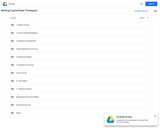
Full Writing Fusion course for North Shore Community College.
- Subject:
- Composition and Rhetoric
- English Language Arts
- Material Type:
- Full Course
- Provider:
- Northern Essex Community College
- Author:
- Clare Thompson
- Date Added:
- 05/14/2019

Full Writing Fusion course for North Shore Community College.
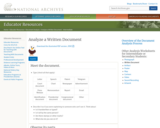
The following document analysis worksheet was designed and developed by the Education Staff of the National Archives and Records Administration. You may find this worksheet useful as you introduce students to written documents.
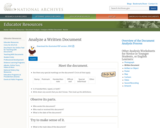
The following document analysis worksheet was designed and developed by the Education Staff of the National Archives and Records Administration. You may find this worksheet useful as you introduce students to written documents.
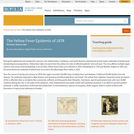
This collection uses primary sources to explore the Yellow Fever Epidemic of 1878. Digital Public Library of America Primary Source Sets are designed to help students develop their critical thinking skills and draw diverse material from libraries, archives, and museums across the United States. Each set includes an overview, ten to fifteen primary sources, links to related resources, and a teaching guide. These sets were created and reviewed by the teachers on the DPLA's Education Advisory Committee.

This unit introduces children to a number of concepts related to water. First, students activate and build on prior knowledge as they explore various places where water is found (e.g., lakes, rivers, swimming pools). In the second lesson, students differentiate between water found naturally (e.g., a lake) and artificially (e.g., a swimming pool). The third lesson focuses on the uses of water and its importance for human life. Next, students learn about the various states (solid, liquid, gas) that water can be found in. In the final lesson, students learn what people can do to conserve water and care for this natural resource. Throughout the lessons, students are exposed to songs and books about water. The unit culminates with as assessment that asks pairs of students to create a nonfiction question-and-answer book about a specific representation of water. Description of the assessment task with an optional technological application is also included.
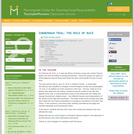
In small groups and in a fishbowl discussion, students consider how race affected the trial of George Zimmerman for the murder of Trayvon Martin.
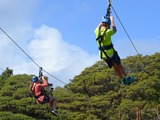
A park ranger needs to build a zipline to drop food supplies to her mentor park ranger at the bottom of a gorge. Unfortunately, she does not have the instructions to build the zipline according to the proper specifications. Without directions, she is unsure of the correct angles to attach her zipline to each tree. Additionally, she needs to figure out how to open the chute to drop the food supplies. Challenge: Create a zip line that will release from her bucket (paper cup) the food supplies (represented by a marble) onto the target (placed 5/8 of the way down the zipline) before the gear reaches the opposite end of the zip line.